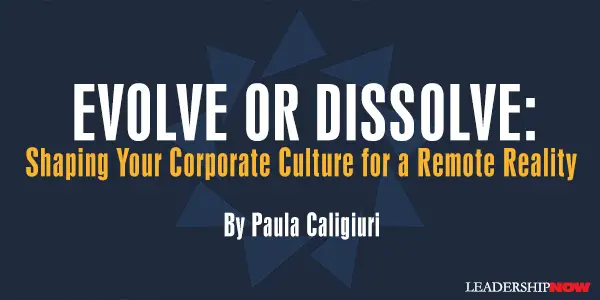 |
 |
02.09.24

Evolve or Dissolve: Shaping Your Corporate Culture for a Remote Reality
IN THE PAST DECADE, the corporate world has seen a seismic shift in how it operates. The advent of technology that enables remote work combined with the ever-increasing rate of employee turnover in many industries has led to a transformation in the very fabric of organizational culture. Businesses striving to adapt and thrive amidst these changes must find innovative solutions to the matter of maintaining a robust corporate culture. The Erosion of Traditional Corporate Culture A strong corporate culture will influence how team members interact and conduct business. Teams operating within a strong culture share a set of values, beliefs, and behaviors. These are learned over time and socialized when newcomers “learn the ropes” from interactions with and observation of colleagues and leaders. But today’s decentralized office environment makes it harder to socialize culture, foster a sense of unity, and reinforce shared values. Additionally, greater turnover rates disrupt continuity and the transmission of cultural values, leading to a disjointed and often weakened corporate identity. Importantly, if corporate culture is left unattended, over time it will weaken and dissolve. Remote Work: A Double-Edged Sword While remote work offers flexibility and can increase productivity, it limits opportunities for spontaneous collaboration and social interaction — both crucial for building a cohesive culture. Without the organic conversations that occur in physical office spaces, employees can feel isolated and new hires may struggle to assimilate into the company’s ethos.In attempting to bridge this gap, Google, for example, has invested in virtual reality technology to create more immersive and interactive remote meetings. Using a very different approach, companies like Yahoo and IBM, once pioneers in remote work, reconsidered their remote work policies and brought team members back into the office to preserve their corporate culture. The Impact of High Turnover Frequent employee turnover further complicates the picture. Each departure is a loss of cultural knowledge, and each new hire is a potential cultural reset. This constant flux can make it more challenging to maintain a stable and consistent corporate culture. If companies experience increases in short tenure among senior associates, they will have fewer leaders able to transmit the corporate culture. Some industries, such as professional services, hospitality, and retail, are experiencing higher turnover rates, impacting the maintenance of strong corporate cultures. 5 Strategies to Strengthen a Weakening Corporate Culture In response to these challenges, companies must be proactive in nurturing and evolving their corporate cultures. Here are five strategies to consider:
The evolving landscape of work presents unique challenges to maintaining a strong corporate culture. However, with thoughtful strategies and tools like myGiide, companies can adapt and even thrive in this new era. By focusing on communication, connection, adaptation, socialization, and recognition, organizations can forge a resilient and dynamic culture that withstands the tests of distance and turnover.  
Posted by Michael McKinney at 10:38 AM
|
BUILD YOUR KNOWLEDGE
 

How to Do Your Start-Up Right STRAIGHT TALK FOR START-UPS 
Grow Your Leadership Skills NEW AND UPCOMING LEADERSHIP BOOKS 
Leadership Minute BITE-SIZE CONCEPTS YOU CAN CHEW ON 
Classic Leadership Books BOOKS TO READ BEFORE YOU LEAD |